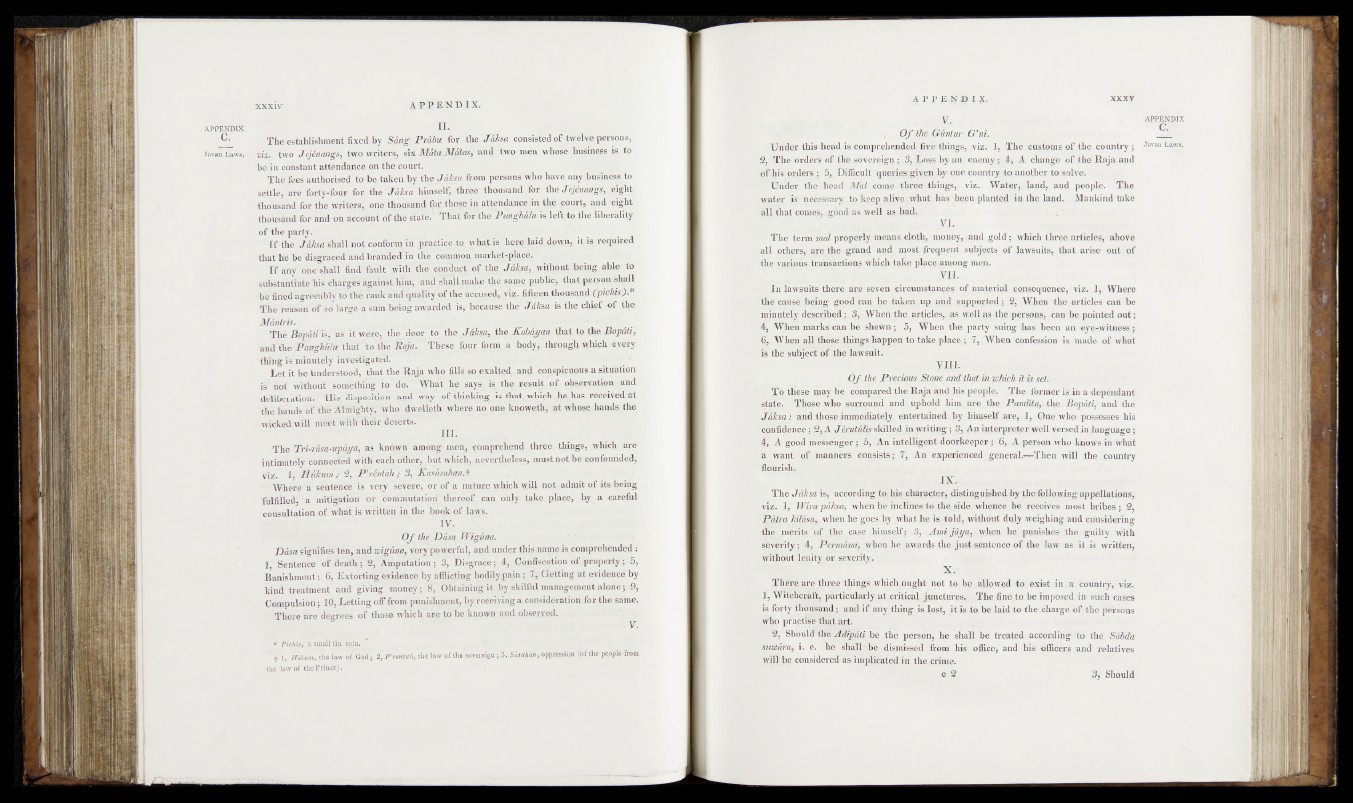
APPENDIX
1 9
II.
The establishment fixed by Sâng Prâbu for the~ Jâksa rmnsiated'o? twelve persons,
m. two Jejénangs, two writers, six Mala Matas, arid two men whose business i's to
be in constant attendance on the court.
The'fees authorised to be taken by the Jâksa from persons- who 'have any biisih®^ to
settle, are forty-fouT for the Jâksa himself, three thousand for the Jejénangs^&gM
thousanddbr the writers, one thousand, B | | B u attendance in the pourt,- and, pight
thousand for arid on aécoiinl rif the slate. Thalforlhe PangUlu is left to the liberality
. of the party. _ . ■ ,
—'ïf-thë J&faa. shall riot confond11 practice tg. yvhat ^.herg-Jaid down, it(is required
that hé be 'disgtacfed and branded in the Cpmm^mgrl{1e{,“p,]^p;< t
If ariÿ 6he'shall fiçÜ fault. Jrifo«, ynfteM feeing abforto
substantiate his charges against liiin, anïshaUmake the same public, that person shall
■be fined agreeably to the rank arid quality of thé accused, Viz. fifteen thousand (pidiis)-*
The reason of so large a süm being awarded is, because the Jâksa is the chief of -t^e
, , y._. iw«‘ ffly.ft.ovl* seigy ■
The Èôpâti &,°W It were, tëe door t<ri thé ^4%«,. ^>e Kabpyan. to the Bopâti,
and the PangMlu that to the Raja, these four form a body, through which every
thing is minutely investigated.
Let it be fanderstood, that the Raja who fills sç.^xalféd conspicuous a^tri^tion
is riot without strife th ing to'" do. What hg^says^ ^ the result, of, observation - and
deliberation'/1 His, disposition and way oTthinking th^t which he. has received at
the hands of the Almighty,1 who dwelleth where no one knoweth, at whose hands the
wicbed will frieet' with-théir deserts.
■ .J iÎA a
The Tri-râsa-upâya,tsiis known among men. comprehend jjÿiÿee ^tfoUgs, wWçhjISrë
intimately connected with each other, but which, nevertheless, must not be confounded,
viz. 1, Hûkum; 2, P ’réntah ; 3, RasusahqnA._
: Where à srintëricé.'is very severe,’ orrif a na.tur.p which wjH pftfoudnjtt of its being
ïtdfiiïel;J a 'mitigatidn or 'cômniutritiorf' thereof, can. only take place,, by a eare&l
consultation of what is written in the hook of fows.
IV. '
Of tile Dâsa Wigunq.
Dâsa signifies .ten, and migûna, very powerful, and under this name is comprehended :
1, Sentence of death ; 2, Amputation ; 3, Disgrace; 4-, Confiscation of property.; 5,
Banishment; 6, Extorting evidence, by afflicting bodily-pain; 7,' Getting at evidence by
kind treatment and giving money; 8, Obtaining it by skilful management alone ; 9,
Compulsion ; 10, Letting offftom .punishment, by.receivings consideration for the same.
1 There are degrees of those which are to be known and observed.
:d« V.
: .V* TtcfliM % small tin coift.
.j. I" Huhim, tbe taw of God; 2 ,P ’rmtah, the law of the sovereign ; 3. Stuahan, oppression (of the people, from
the law of the Prôriè). ’ .
:a F-.
U -OfvtffâÿÇyûnlur G’pi.- B
Under this headis'coTOprehendedifiyeffoiflgs, viz; 1, The cusjtoms of the country;
g, The orders of the sovereign Loss by an epemy ; 4j A changé of the Raja and
of his orders ;. fi,, Di&cpk "querfo.^jgiyep.hy ene-.çountrjtitpi&pother to aolye. . ‘.
Under tne-VKead 'IkSïfocqme'ittfiree-sthings, .-viz,- Water,.land, and people. The
water is. {îeçpssary .-tq.keep alive what has been planted in the land. Mankind take
all that copies, Tg,oo.d as <well as bed,
-7 |
SflT^he" term1 mal' properly, means doth, money, and gold'-;,, which three articles, above
pll o^er?,( are the grand and ,mostJreqncnt subjects of lawsuits,- that arise out of
the vailo.u^ transactions -which' tahe place among men> ■
j. li f ja l..,
In lawsuits tberë^are seven- pircum stances of material consequence, 'viz. 1, Where
the caug.e being good can, he .taken up and supported ; g, When the articles can be
minutely described; 3, When the armies, as well as ithe.pepspijs, can be pointed out ;
4-, When marks can be shewn ; 5, When the party1 suing has -been an eye-witness ;
6. AVhen all those things happen to bake place ; 7, When confession is made of what
^ the subjeétof the lawsuit.
: ùii£
Of the Predoug JStone and that in pskichtit-is set. '
To these may be, .compared .the -Raja and fois people. The former is' in;a dependant
state. Those avho surround and uphold him are the. Psirqilta,. the ;Bopôîi, and the
Jâksa : and those immediately entertained by bitnself are« Is .One who possesses his
'con’fidence ; 2, A Jérutû&s skilled in writing ; 3, An interpreter, well Versed In language ;
4, Â 'good, messerigër ; 5', An intelligent doorkeeper ; 6,.„A person who knows in what
a want _of manners consists ; 7, An experienced general.—Then will the country
flourish.- y ■
IX.
The Jâksa is, -according to;his-..character, distinguished by the following appellations,
viz. 1, Wira pAksit, when he inclines ito the side whence' he; receiVesiifop^t bribes; g,
Pâtra kilcisa, when.he goes by what he is told, whho# duly weighing and considering
the merits of the .case himself; ^ ^Ami^âÿ/di.-''Vhep he' punishes' the guilty with
severity; 4, Permâna, when he awards the just sentence of the law as it is written,
without lenity on severity, , ,i,
X.
There, are three jthiggs -whiph.ought’ not to(.b,e allowed to exist in a country, viz.
1, Witchcraft^ particularly at critical junctures, Th® fin'd .to be imposeddn- srich cases
is foyty .thousand; gn,d if'any tfiing.islost, it is to be laid to the chargé of -the persons
who praetise-TOat art.
r ■ "Should thé Àdipâti be the person, he shall be treated according-to the. Sabdti
suwâra, i. e. he shall be ..dismissed from his office, and his officers and relatives
will he considered-aS-implicated in the crime.
APPENDIX
'
Javan Laws.